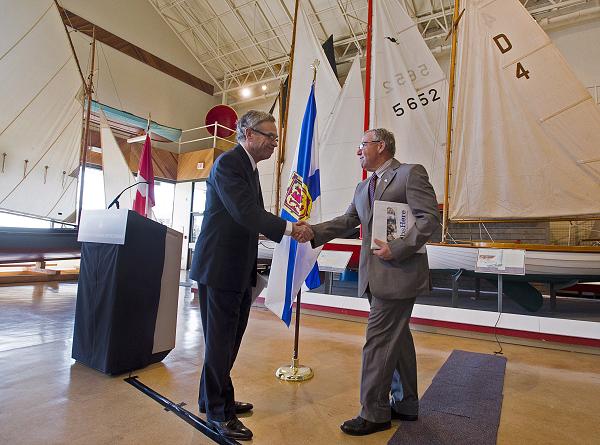Canada raising offshore liability cap to $1 billion in Arctic, Atlantic waters

HALIFAX — The Canadian government is planning to introduce new rules to make drilling and production companies more accountable in the event of offshore spills.
Federal Natural Resources Minister Joe Oliver, speaking at a news conference Tuesday in Halifax, said Ottawa will introduce legislation this fall to raise the liability cap for companies operating in Atlantic Canada’s offshore to $1 billion, up from the current $30 million. The liability cap in the Arctic would also increase to $1 billion from the current $40 million, he said.
“This means companies would bear up to $1 billion of responsibility for spill cleanup costs and compensation for damages whether or not they are at fault,” said Oliver.
He said the move is aimed at aligning Canada’s rules with countries such as Norway, Denmark, the United States and the United Kingdom.
The changes would also be put in place in Nova Scotia and Newfoundland and Labrador to make the so-called polluter-pays principle explicit in provincial legislation later this year.
Oliver said companies are currently responsible only for cleanup costs and damages with measurable economic value. He said the changes would include so-called non-use value such as damage to the environment in liability calculations.
“This will provide an additional basis for government to pursue operators and to recoup financial compensation for damages to coastlines, habitats and species.”
The minister said companies are required to prove to regulators that they have the financial ability to meet their liability.
The current minimum requirement of proof is between $250 million and $500 million, something Oliver said would be increased to $1 billion.
He said the deposits regulatory boards require, which haven’t changed since the 1980s, would also be boosted from $30 million to $100 million or companies would be allowed to pool their resources to make sure a $250-million industry fund would be available in the event of a spill.
Changes aimed at increasing transparency would permit the public release of emergency plans, safety plans and environmental effects monitoring reports through provincial offshore regulatory boards.
The boards would also be given the authority to levy yet-to-be-determined fines.
Nova Scotia Premier Darrell Dexter said the changes would ensure safer operation in his province’s offshore.
“With the great potential in our offshore comes some risk,” he said. “The changes announced today help reduce that risk and make companies more accountable for their actions.”
Gretchen Fitzgerald, director of the Atlantic Canada Chapter of the Sierra Club of Canada, said while an improvement, the new liability cap doesn’t go far enough.
Fitzgerald said there should be no limits on liability when there’s a spill.
“If you want to go out there and play in the offshore, it’s a high-stakes game,” said Fitgerald. “These are some of the richest companies in the world and they should be able to pay.”
Darcy MacRae, a spokesman for Nova Scotia’s Energy Department, pointed out that unlimited liability would apply should a court find a company at fault or negligent for a spill.
Meanwhile, Oliver said he couldn’t guarantee the legislation
“It is our intent to look at this legislation this fall and we’d like to see it happen expeditiously,” he said.



